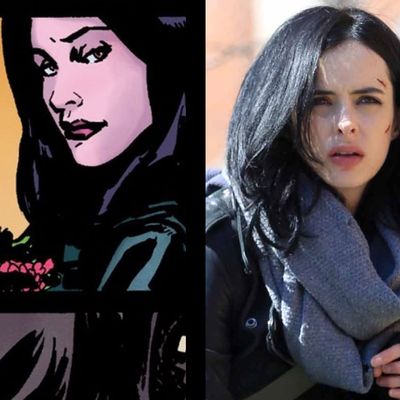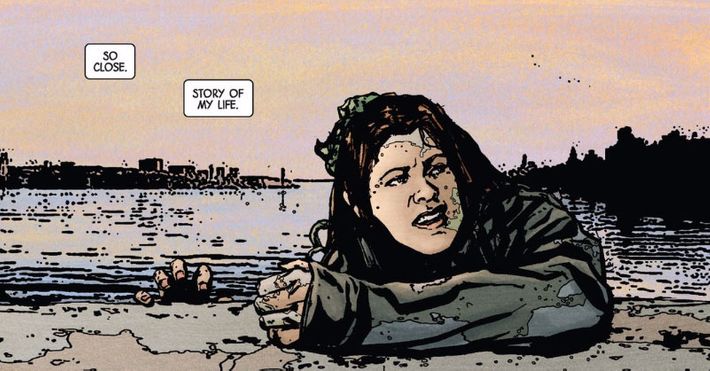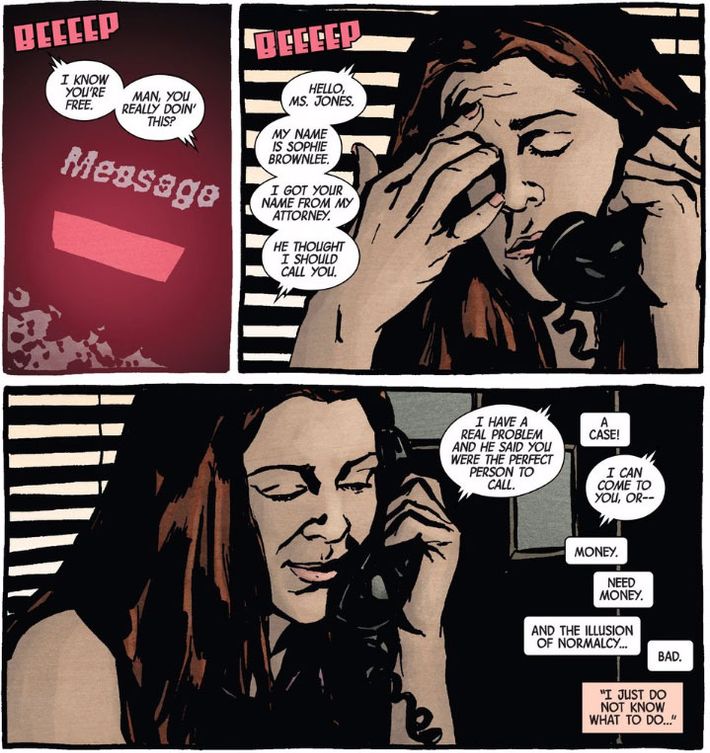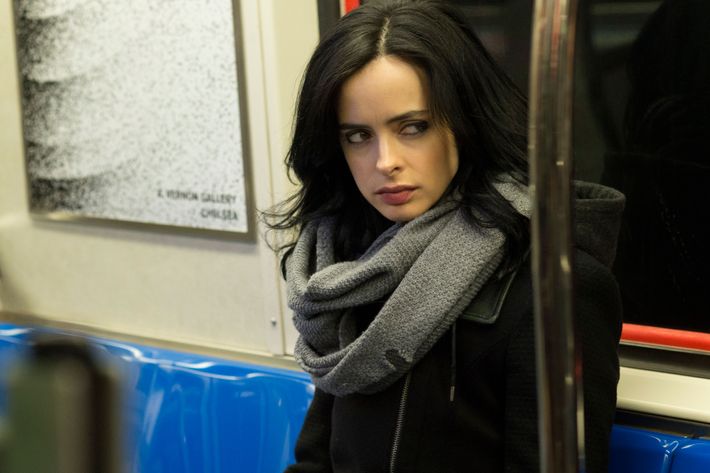
Fifteen years ago, Marvel Comics released an odd new series called Alias, written by Brian Michael Bendis and with artwork by Michael Gaydos and Matt Hollingsworth. It starred a brand-new character, which is always a risky proposition in the nostalgia-reliant ecosystem of superhero fiction. It featured explicit sex and profanity, meaning it had the potential to spook retailers out of carrying it. And it shared its name with an unrelated TV show that premiered in the same month, potentially confusing readers. Yet in spite of all that, Alias became one of the most acclaimed comics series of its era. More importantly, it planted a seed in the soil of superhero fiction in the form of its protagonist — an alcoholic, acerbic, ex-superhero private eye named Jessica Jones.
When he first had the idea for Jessica, Bendis couldn’t have predicted that she’d one day become the title character in one of the most buzzed-about television shows of 2015. The superhero-film landscape was barely in its infancy at the time, meaning comics creators rarely bothered hoping that anything they did would have a life on the screen. Now, a decade and a half later, Jessica has gained a fan base among viewers who’ve never picked up a comic or enjoyed a superhero movie. But even as Jessica entered TV critics’ year-end best-of lists (including our own), she was absent in the medium where she originated: Curiously, there was no Jessica Jones comics series.
Wisely, Bendis has rectified that. He has reunited with Gaydos and color artist Matt Hollingsworth for Jessica Jones, which debuted in October and finds the eponymous screwup in mysterious circumstances. Although Jessica’s comics incarnation has evolved a lot in recent years, becoming a wife and mother and generally cleaning up her act, the new series opens with her being released from prison. How did she get there? Where’s her child? And what’s the deal with her newest case, which may or may not involve a guy who survived a cosmic alteration of the universe? We caught up with the veteran writer to find out why it took so long for Jessica to return to the printed page, how a fateful conversation with Jessica Jones showrunner Melissa Rosenberg led to the new series, and how he approaches sexual violence differently than the show.
The Netflix series was this huge hit last year, but there wasn’t a new book on shelves until nearly a year later. What took so long?
It was like, Should I do another Jessica series? It’s one of those things where you’re like, Is it going to be [Chinatown’s failed sequel] The Two Jakes? I think about that a lot when things like this are offered, particularly with Jessica. It’s a unique experience to have a show that has the character in one place, but in the comics, she has, over the last 15 years, gone into another place. There’s usually the illusion of change, but Peter Parker is still Spider-Man, you know? Everything’s pretty much, comfortingly, the same. Whereas Jessica is now married with a kid and there’s a lot of other things going on. She was pushing past the Kilgrave stuff.

But at the same time, Melissa and I were having a nice back and forth, and we got together at some conventions to have drinks and talk about where to take the character. Any time two writers are sitting there, talking about the character, both writers are formulating a pitch. You can’t help it. It’s the way your brain is trained. After talking about Jessica at WonderCon, I emailed Melissa later in the week and went, “Shit, I think I might have to do this. I’m thinking about doing the comic again, because the last conversation we had made me think of this.” And she went, “Do it!” Once you have a story, boy, you’re done — it’s very hard to come up with reasons not to do things. That’s the bane of any writer’s existence. I told Marvel, “If you guys are ready to go on Jessica, I got something.” Michael needed a few months to finish something he was working on, but that gave me time to do research and get it all polished up.
How often have you met Melissa in person?
Not a ton of times. She had me come to the writers room early, right when it had just been put together. They were allowed to have at me for whatever they wanted to talk about. I remember calling [Marvel television chief] Jeph Loeb afterwards and going, “Well, I gotta say, they were asking the right questions, and that’s a good sign.” Obviously, everyone knows this now, but Melissa’s point of view on the character was exactly what that show needed. I was immediately grateful because it was in the earliest drafts of her scripts. You read them and right away, the stuff that I was worried about, I was relieved.
What kinds of things had you been worried about?
Just softening the edges of things that were important to the character. You’ve seen this happen in television and movies before. This character doesn’t need that and there’s no point to it. As a man writing this character, there’s always that worry that you’re off the mark. And then to find out, in this instance, her experience and my feelings about the experience matched, it was a relief.
That nervousness makes sense, given that Jessica is so definitively a creation from you and Gaydos. She’s not a revival of or riff on an existing character. There hadn’t really been anything like her in the superhero canon. An adaptation of her must feel quite personal.
Yeah, there is a part of Jessica that is a big part of me. I’m not an alcoholic, abuse survivor, private eye; but spiritually, there’s a huge connection, and a bad show would have really hurt me. Also, the material, from the earliest comic book, wasn’t a TV pitch. Sometimes you read comics and you go, “Oh, it’s a very good comic, but it’s so clearly a movie pitch” or “It’s clearly a TV pitch.” I’m not saying one can’t be a comic, too, but sometimes you can see both and sometimes you can see stuff where you go, “Well this person doesn’t give a shit about Hollywood.” In that instance, I can honestly tell you, even though I’ve had stuff adapted, I was not thinking about Hollywood when I was working on Jessica.
You talk about her being an abuse survivor. One thing that struck me after seeing the show was that the comics version of Kilgrave very specifically doesn’t rape Jessica. He does horrible stuff to her and puts her through forms of relationship trauma, particularly by raping other women in front of her, but he never actually engages her physically in that way. Why?
I thought, in a way, the more horrifying idea was the fact that he didn’t, and could have, and made her think she wanted him to — that the mental rape was worse than the physical rape. People reach out to me almost daily on social media and express how cathartic the show was to them, and that they went into the comic and it was even more cathartic. Whatever real thing that real person was going through is so much more important than Jessica’s fake, made-up stuff. So I always get a little squirrelly when talking about it, but at the same time, I don’t discount that a show like Jessica can make people feel better or more normal. I just feel, as a dude who has never been through anything like this, that even talking about it feels weird. But I’m glad the show is there for people who need it for that reason.

Right, and the show goes in a different direction, because there is rape in the Jessica-Kilgrave relationship. What did you think of how that was handled in the show?
I was told, “We’re just gonna go for it. I know you said in the comic, it didn’t happen. We’re gonna say it happened.” I remember hearing that and going, Hmmmmm, then thinking for a while about why I never did it. And I realized, I made the right choice for me as a writer then and they’re making the right choice for them as writers now. I thought about how much is different and how much has changed, and if it’s not brought up in Jessica, when will it be brought up? So I was like, “Yeah, you should.” I thought that Melissa and the writers were the people to do that and that medium was better-suited to tell that kind of story.
That was one difference, but I’m sure there were others that caught you off guard. What revelations did you have about your own character while watching someone else’s interpretation of it?
I liked the way they presented her powers. The camera kind of loses interest in her when she’s leaping. I loved that because we were always trying in the comic to not show superpowers the way you always see them in comics, which is the hero punching the villain and the villain swinging towards us. That was the one aspect where I went, I’m a little jealous. Even though people pointed out we did do a couple of things similarly in the comics, the show made so much more of it that I was like, Ugh, I wish I had thought of that.
I’m getting the sense that you weren’t around for much of the actual filming of the show.
Here’s what’s funny: I would get updates all the time that things were going well. They were like, “Come to the set!” And I’m like, “Oh no, I’m not gonna come to the set. People are working on the set, they’re not farting around. There are people trying to get emotionally invested in their moments and trying to work. I’m not gonna bother them.” So, I didn’t.
And then, this spring, Jeph called me up and said, “We’re going to the Peabodys.” And I’m like, “Oh yeah, let me check my calendar.” He goes, “Brian. You’re going to the Peabodys. I don’t care what else you think you’re doing that day. How many times do you think we’re gonna get this call?” So I went upstairs to my wife and said, “I think I have to go to the Peabodys.” [Laughs]. It was actually at the Peabodys where I met [Jessica Jones actress] Krysten [Ritter] for the first time, because I had skipped that New York Comic-Con surprise screening.
Oh, man, you really missed out. I was there and the crowd really lost it.
I was supposed to be there and I had somewhere else to be, something equally important. And I’m just like, Ah, okay, it’s a convention, we’ll be fine. And then Gaydos and [Alias cover artist David] Mack are texting me like, “This is the greatest thing that’s ever happened!” I felt like I had tickets to the World Series and went, Nah, it’s okay. But I must say, I was happy I didn’t go because I get an inordinate amount of attention for Jessica. There’s a tendency that the writer gets more attention, but when a character like Jessica’s created, it’s equal parts me and Michael. I was thrilled that Michael, who was able to go to that screening, could stand up and get an ovation. Him and David both are so important to the character.

And as soon as you decided to revisit the character, you knew Michael needed to do the art?
Yeah. I’ve worked on Jessica with other artists, because she’s part of the Marvel universe, but it just seemed that the whole band needed to get back together for it to be proper. I also knew over the year that Michael really enjoyed how much people enjoyed Jessica, and it’s very strange to have a book be more successful 15 years later than it was when it first came out. I was relieved and thrilled that it had done so well on the direct market, because it’s an adult book — there are parts of the country that still can’t carry it.
Really?
Oh, yeah. I’ve visited stores in Florida who said to me, “Good Lord, do we love Alias, but we can’t carry it because there are members of organizations that come in here looking to see if we’re carrying what they consider to be porn so that can shut us down.” This is reality! People forget, but Alias No. 1 was rejected by the printer for content. There’s no nudity in that book, but we found out that they did not appreciate the interracial relations. And it was a printer that printed pornography! Like, actual fetish pornography!
Such is our country. Are there traits of Jessica’s in the new series that you picked up from watching the show?
You know what’s funny? The only thing I will cop to is this: Someone pointed out to me is that Krysten Ritter never says the F-word on Jessica Jones, and for the life of me, I feel like I heard her say it, like, 20 times. You still can’t convince me. It’s because her face has a magical superpower of looking like it’s saying, Fuck you. So I’ve been thinking about using that language better in the comic. Sometimes, I look at some of that [old] work and go, “That’s a young writer trying to use the F-word all the time.” The show and the comic’s similarities are interesting and their differences are interesting. Now that the comics version of Jessica and the TV version both exist and have their footing, it seems that Jessica Jones the show should make the most out of being a TV show, and Jessica Jones the comic should make the most out of being a comic. They should complement each other, and at the same time, be completely different experiences.
I interrupted you when you were talking about meeting Krysten Ritter at the Peabodys, so let’s get back to that. What did you guys talk about?
I profusely thanked her, because I know a performance like that is not pretending. You’re digging deep. When someone digs deep to offer something with my name on it, everything they have, there’s no way to properly thank them other than to look them in the eye and say, “I know how much went into that and I really, really appreciate it.” It was wonderful at the Peabodys to stand on the stage with Melissa, though it was a weird feeling looking down and seeing in the front row Steve Martin, David Letterman, Jon Stewart, all my heroes. And they don’t know who the fuck I am. [Laughs.] But Melissa gestures at me and loudly pronounces into the microphone that I was one of the creators of Jessica Jones, and they applaud. For all the weird things that Jessica’s brought into my life, looking down and seeing Steve Martin and David Letterman applauding was one I never thought I’d get.
This interview has been edited and condensed.

